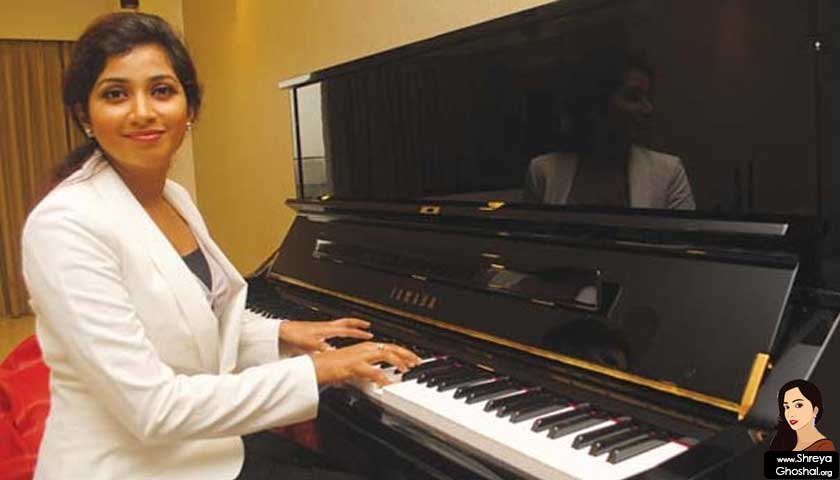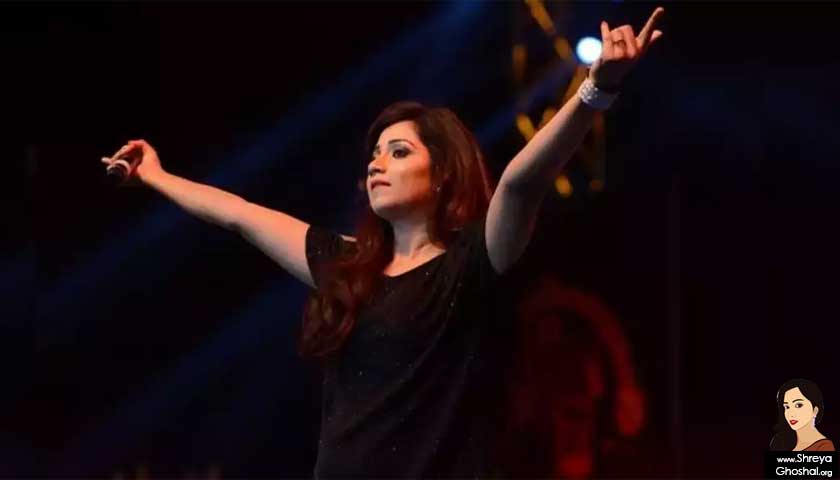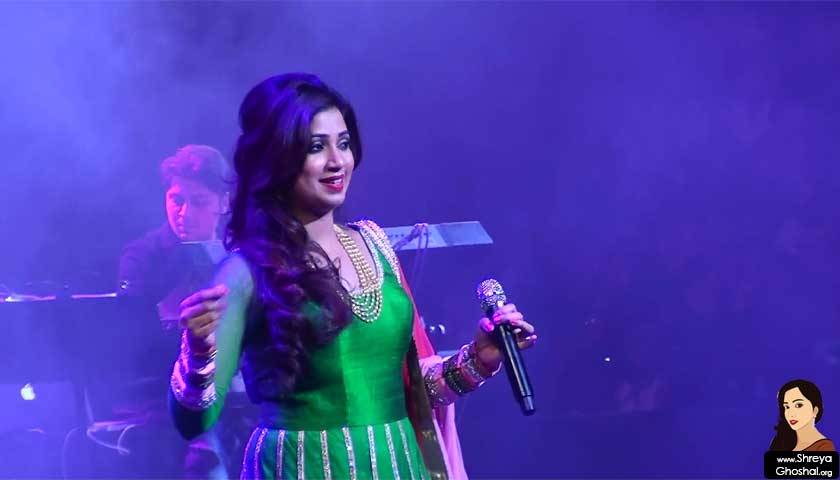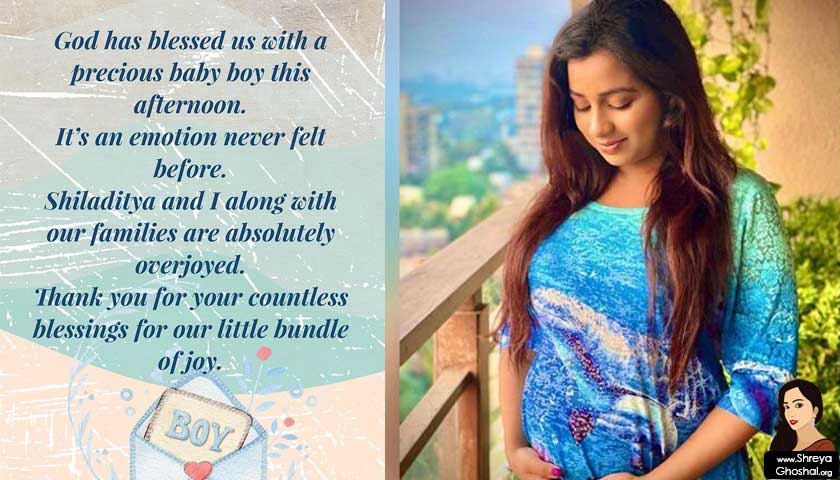Chit-Chat with Shreya Ghoshal
Success means staying grounded. This mantra has made Shreya Ghoshal the leading female singer of Bollywood, a position she has consolidated by not taking the first offer that came her way, by exercising self-restraint and concentrating on polishing her talent. The reality TV star from small town India has snapped up award after award, including two National Awards, five Filmfares and four IIFAs, within a short career span of seven years. She has an apartment in Juhu but chooses to meet Chandan Mitra at her father’s flat at the BARC complex in Mumbai because she is at home there, feels anchored. She talks about growing up in a close-knit community of scientists, her forays in talent hunts and her karmic connection with Sanjay Leela Bhansali
I think you have disproved many notions – that a reality star is as good as the last season, which you need to have a godfather in the industry to be successful or that you can’t make it from a small town. Do you agree?
I would like to add though that in the end you need a big city to do your career-related work. But yes, nowhere else could I have concentrated on my talent better than at Rawatbhata, a small town near Kota, Rajasthan, where my father was a nuclear power plant engineer at the Bhabha Atomic Research Centre. I had a wonderful childhood, a perfect growing-up in its peaceful, easy environs. There was no distraction, not even a movie theatre (I had never been to one before I came to Mumbai) or what you would call a hangout. I remember our complex was next to a lake called Rana Pratap Sagar and unlike the rest of Rajasthan, it was very serene and green. It was just like heaven. As a secluded, idyllic community, we bonded over many group activities, particularly cultural ones like drama, dance, music and choir-singing. The atmospherics were there to develop another creative facet. But it was at home that I became serious about my music. Baba is a very big music lover and my mother used to sing well. I remember her rehearsing on the harmonium daily with absolute dedication. She was not a professional singer; still she practised as if it meant the world to her. That was my first experience of passion. Sing to your heart’s content no matter what the returns.
(Her mother joins in) Even when Shreya was two, I could sense the melody in her voice. I realised she was gifted and let her join me during my riyaaz sessions. She mastered the basics at a young age. (Shreya interjects) You could say all my riyaaz happened in Rajasthan. With nothing else to divert my attention, I became focussed rather early on.
How did you graduate to singing at public functions?
Since everybody at Rawatbhata knew that singing was my forte, I became a regular at the culture shows at the officers’ club, be it on annual days or Durga puja. Though I knew by then that music was the only discipline I was good at, these shows made me comfortable on stage. At the same time, I realised that I had to hone my raw talent, learn specifics and grammar from a guru and graduate to the next level of understanding music. There was no guru at Rawatbhata, which was full of engineers and scientists. But don’t they say that when you want something really bad, the world conspires to give it to you? My opportunity came when our school got a music teacher, Jayvardhan Bhatnagar. Though he was not much into classical but Rajasthani folk, his enthusiasm were infectious. I will never forget him for making me believe that if I have it in me; I should chase a rainbow to world’s end.
Call it providence but one day somebody put up a poster at the local market, advertising the regional rounds of a national level competition organised by the Delhi-based Sangam Kala Group. Baba saw it and said let’s participate. The year was 1994, I was just 10 and it was the first time I stepped out into a competitive world from my sheltered existence. I won in the sub-junior category and was selected for the national round in Delhi. I didn’t win though. I was sad, convinced myself I would try again and indeed went on to win the sub-junior title the second time round.
What sort of songs would you choose for these performances?
I would sing mostly Lataji’s songs because I had grown up on them. Everybody in my family was a fan. Apart from classical music, I liked all her songs, be they from the 50s, 60s or 70s. I would sing compositions of Madan Mohan and Shankar Jaikishan, some semi-classical, others emotional and soulful songs that would touch any listener as they did me. It was never about singing a difficult number to impress the judges about my range and capability, it was always about what I liked and suited me best.
What happened after you won?
In between these early contests, we got to know of Mahesh Chandra Sharma, who headed a music school at Kota and to whom I credit all that I know today. I got enrolled for formal training in Hindustani classical music. It was a very long journey from my place to Kota. My parents would take me to him over the weekends. We would go by bus, even in the heat of summer, having cucumber or washing ourselves in the stream near which the bus halted. I have enjoyed and savoured each of these experiences on my journey to Mumbai. They’ve made me what I am.
How did Sa Re Ga Ma happen?
There was this show I got called for on EL TV. Around the same time, Sa Re Ga Ma had just started on Zee TV and they would invite entries at the end of each show. On the spur of the moment, I recorded a song on the karaoke with Baba’s doctor friend playing the tabla and sent it to Mumbai. Then I got a call saying I had been selected for the show. My journey to Mumbai had begun. Imagine the excitement in a place where courier services weren’t too common.
My episode was the 75th of the show and the first or second children’s special. The judges were Kalyanji-Anandji. Meeting Kalyanji uncle was a turning point. He assured me that I sing well and urged us to move to Mumbai. For two years after that, I would come to Mumbai on and off to learn music from him. I remember he was very sick at the time; he was suffering from bronchitis and asthma. But he never lost his zeal to teach. Then Baba managed to take a transfer to the BARC facility here. In the meantime, I won several episodes and being a perpetual contestant on the show, they would keep recalling me for their specials. I got really serious because this was the first time I began to understand the value of audience appreciation and a good performance.
(Dad) They called her for the 100th children’s special episode, which was a live recording at the Andheri Sports Complex. It was the first time they introduced voting on the day’s performances. Viewers were asked to send in their choice on competition postcards. She was declared winner with 85,000 votes. And back then there was no online or SMS voting.
(Shreya) The public adulation mattered a lot. That many people had bothered to pick up a postcard and send it to the studio for a girl they didn’t know. I won the children’s mega final in 1996 and then won the adults’ round. I was 13 when I contested for the adults’ round. One of the contestants had fallen sick and I was asked to fill in. My mother got me a frock but the organisers said that I would have to look convincing. Then she got me a salwar kurta.
There was no looking back then?
It was a gradual and enjoyable journey. Sometimes offers came to me naturally, at other times I had to make an extra effort to prove my worth. Along with Sa Re Ga Ma, I had already started recording Bengali and Marathi albums with Sagarika Music. Though I don’t have an organic connection with Kolkata, the city gave me much and today I am rooted to its musical heritage. It was a learning experience. I mostly sang Marathi songs at stage shows.
I read somewhere that you prefer recordings to live shows. But doesn’t every performer long for the energy of the latter?
You can’t compare the two. The interactive experience at a live concert is great but you can get more creative while recording. You are involved in making the track beautiful. You may not like every song given to you. If you don’t like it, you have to add your inputs and make yourself love that song, make it more interesting. If you don’t feel right, you won’t soar with the melody. I find this more challenging. Besides, it is at studios that you get to work with excellent musicians like AR Rahman and Ilaiyaraaja. The time I spend with them is the best moment of my life.
When did mainstream commercial singing happen?
I never geared myself up for playback singing. The only thing I was concerned with was getting my music right, feel it to the core. I was not running for recognition, I slowly drifted into it. Before I did my own album in Bengali, I was asked to do a cover version of all-time maestro hits. I was overawed, knowing I would be measured against these great performances and at the same time not just be an imitator. I would get the scratches of the originals and try to understand the nuances, the maturity of smooth artistry, and the mood. Those days rarely was anybody asked to do cover versions of the greats except Sadhana Sargam, who was allowed to sing Lataji’s hits. Even if in Bengali, I considered myself fortunate to sing songs of varied artists in their varied styles, slipping into their moulds unconsciously.
That album was a big hit. About 30,000 cassettes sold and it is still selling. The company then gave me an album of original Bengali songs. That was quite successful too and gave me a tremendous reach, experience and confidence. Meanwhile, my Marathi albums started doing well. I concentrated on bhaav, abhang and sang songs of Sant Gyaneshwar which are close to the heart of every Marathi. I could sing these songs only because Sanjay Upadhaya helped me understand its literature. I couldn’t understand too much back then. These days, I refer back to my notes and realise what an enriching experience it was.
These experiences strongly put me on track of good music rather than diverting my attention. I must remember Falguni Roy of Sagarika with whom we had a four-year contract. But never for once did I think of re-negotiating it because I felt I had to wait for the right time and opportunity.
How do you take that call, realise this is it?
Depends on how you look at struggle. My struggle was with the process of learning rather than becoming a star. My hard work was in absorbing music, not going door-to-door to music directors. I won’t deny there were a lot of offers for live shows, particularly after my Bengali hits. Some of them were very tempting but I decided I wouldn’t go on stage being a mimic artist, I would become somebody first. I remember somebody had told me that if I had done shows for just one season, I could buy a house. Another person in Kolkata was ready to pay me higher than Rs 10,000 per show, even giving me more than the highest paid singer there. I rejected these offers, became a student of another guruji and kept learning. These are make-or-break decisions and not easy to stick by. Self-restraint has been my biggest struggle.
Kalyanji made me aware of this. I felt a bit left out when he sent his other students regularly to his “Little Wonder” shows but included me in only seven or eight. He told me, “Don’t go with the show business. You have talent. Pursue Saraswati, Laxmi will follow. But if you pursue Laxmi, then Saraswati will desert you.” TV had provided me a platform. But it was up to me to bite the bait. Today, the industry is full of vultures that commodify talent. They hire fresh talent young and cheap and put them on stage shows. Parents are happy their kid is getting the exposure he has never dreamt of, he is going abroad, earning good money. When you get caught up between too many performances at 13 and 14, your learning graph flattens. There is no nurturing of talent.
The channels, too, have joined the rat race. Earlier, Sa Re Ga Ma had a contract that you could not perform in a similar show on another channel. And if you did do so, you had to pay a penalty of Rs 1 lakh. Reality TV wasn’t a big business in my time. And it was thanks to it that Sanjay Leela Bhansali found me. And I will forever be indebted to him. For nobody in the industry had the guts to entrust the songs of the most expensive film of its time with a rookie 16-year-old.
How did he spot you?
I remember I was doing the mega finals of Sa Re Ga Ma and the panel of judges included such greats as Vilayat Khan, Zakir Hussain, Pandit Ramnarayanji, Girija Devi, Shiv Kumar Sharma, Anil Biswas and Arnob Mishra. I sang Meera bhajans because I absolutely loved them and Ab Ke Baras from Bandini. My judges asked me to sing it without the background music. It happened so that Sanjayji’s mother was watching this episode and urged him to listen in. And he decided I was to be the voice of his Paro. This was a year before we met and started working. He told me he took some time looking for me because after the show he forgot my name. All he remembered was that it began with an S, that it could have been Shraddha or Shweta. He contacted Gajendra Singh, the show’s producer, and found me out. His office told me to bring a cassette of my recording so that music director Ismail Darbar could listen to it. That was not all. He tested me.
When I entered his office, he asked me to sing whatever I felt like. I sang Jeevan Dor from Sati Savitri. He was zapped because he had been singing the same song that morning. There must have been some karmic connection and he said, “This girl is on.”
The next day he asked me to sing more compositions of Jaidev, Madan Mohan, Shankar Jaikishan and Sajjad Hussain. He Okayed me for recording after the second session and told me it would be included in the film only if it sounded nice. When I cleared that hurdle, he told me I could not consider any other offer till Devdas released and that he should have the right to launch me. It took two years within which other directors approached me on the understanding that if Sanjayji had selected me, I would have to be good. But I stuck by Sanjayji because he had trusted me, than anyone. After the film was launched, he individually arranged all my photographs and promotions. Then he said, “Shreya you are free.” And the rest as they say is history.
I have resonated with him ever since. Just the other day he was wondering out aloud about how a song should be arranged. I said jazz and he told me he too was about to suggest the same. He says he has this telepathy with me and Aishwarya Rai. Sanjayji understands music better than anyone else in the industry, particularly film music. He is a composer, too, and he’s done the music of his next film, Guzaarish. Wait till you hear it. He has also composed Thode badmaash for Saawariya. And like me, he, too, is a great fan of Lataji.
Perhaps, your commitment to Sanjayji is the reason that you are an A-list playback singer today?
Undoubtedly! You have to be patient for the right opportunity to come by. Often people recognise the right opportunity but go for the wrong one. It’s all about individual judgment. Had I been locked up in stage shows, I wouldn’t have been good enough for a Bhansali. I never take on too much work because then the purity of your voice goes. If you’re stressed out and disturbed, it will show in your singing. You have to be honest and sincere about your music, not anything else. You have to be in the water and not get wet. If you get carried away, then you are gone.
Easier said than done, how do you manage to strike a balance?
Maintain industry contacts as your profession demands it. But the moment you get too friendly with these people, you enter the circuit and you will be sucked into a vicious circle of dependence and compromise. Thankfully, I am not that kind of person and people know that. I am much grounded and know when the record deals are not there, I will have to be back where I started from. But I will keep singing, so what if I have to do it at home. It’s important to feel inspired first.
After your experience with Sanjayji, how do you gel with other music directors?
Very well. In fact, the present generation of music directors comprises very good people. There was a phase when music directors made singers feel puny. It’s friendly now. Besides, most music directors are ready to experiment because they have the backing of producers and directors. Some are doing new stuff and introducing new talent. The era of monopoly has gone; it is now an easier environment.
AR Rahman is very patient. I bond very well with Shantanu Moitra who relaxes me completely. He’ll say let’s watch a documentary, do this, that and then record. He has a completely non-filmy approach which works very well with me.
How did AR Rahman zero in on you?
I had dropped CDs at his place in Chennai because I had always wanted to sing for him. It is remarkable how he keeps himself updated about new talent and calls you only when your voice suits his requirement. Apparently, he only wanted me to sing the Tamil song Mundewa (from Sillunu Orukaadel). This song got me my first Filmfare from the south and became a huge hit. It is one of the best songs of my life.
After that song, he probably thought he could do a lot of things with my voice. Then he gave me a wide variety to work with – Barson re Megha from Guru, Bhor bhaye in Delhi 6 and the very peppy Lattu from Ghajini. The fun of working with Rahman is that you don’t expect what you’re going to do. You go unarmed. I go to the microphone directly, he gives me a scratch and a khali loop or he is on the keyboard and doing harmonies. You have to be very fast with him, have a good grasping power. He motivates a fresher and is a very good team leader. He talks less though. He is a very shy person but when he gets close to some people, he interacts a lot. His Chennai studio has great vibes because it is cut off from everything else. It is also the most glamorous waiting room anywhere with the biggest of producers, directors and lyricists lining up to meet him. He’s too talented and everybody wants him.
You are now a regular with him.
Yes, after Blue I would say I am lucky to beep on his radar. His music and way of working is not specific to singers, he is clear about the voice he needs.
Have you interacted with veteran singers and what have you learnt from them?
Manna Dey is superb. He has not been given the crown he deserves but his voice is like butter and his singing so smooth. I have interacted with Lataji. To me, she is Saraswati personified. One day I got to know that she was coming to the studio where I was recording. I took permission from my music director, stopped everything and went down to meet her. Face-to-face with the idol of my life, I was tongue-tied. She had an aura in her soft cotton sari, her diamonds and her politeness. Music is, of course, part of her personality but she is also very intelligent. She told me how I needed to bone up on my Bengali pronunciation since I didn’t grow up in Bengal. She is open-minded and very informed about music. I thank her for mentioning me in her interviews even before I had met her. I have met Ashaji, too, but my interaction with Lataji adds a little bit more to me.
How do you see them as inspiration?
I cannot put myself in their league at all. I think they are blessed people and have been born with music in their cells. I would like to be them both.
How do you adjust to the mood of a song, say a sensual song like Jadoo Hai Nasha Hai from Jism? Do you visualise the situation?
If I can feel the composition, half the battle is won. It is not always possible to take a holistic view because the casting has not been completed. It is also next to impossible trying to understand each and every word of a regional language. The trick is adapting yourself to different arrangements and genres and modulating accordingly. It’s fun.
Do you get time to listen to others’ music?
At home, I only listen to others. Depending upon my mood, I listen to classical, Ghulam Ali or Parveen Sultana. Parveenji has a magical range of vocals and I always want to hear her. On Sundays, when all the family is home, I listen to Rabindrasangeet. In Western music, my recent favourite band is Coldplay. They may not be the best in vocals but there is something about their music.
Do you fear that in an over-crowded industry, you might just burn out faster? Do you think you can last it out the way Ashaji has?
My music is beyond films and a playback career. If I don’t get a call, it’s fine by me. Having said that, let me tell you that experimentation today is only limited to finding exotic, new textures, voices and timber. In the end, Indian films will never say no to Indian melodies. So if I have to analyse my possibilities, I would say I have a pretty good chance. Flavours might keep changing but the heart of Indian music is the same.
Courtesy: Namaskaar, Air India’s in-flight magazine
Published On: Sat, Oct 31st, 2009 – folks.co.in




